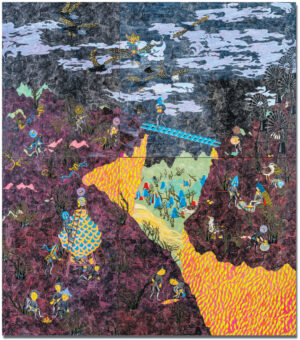Jungil Hong: The Time Being
ODD-KIN, East Providence, RI • odd-kin.com • On view May 19, 2024

Jungil Hong, a Korean-born, Providence-based artist, is reemerging in Jungil Hong: The Time Being. Both retrospective and introspective, the exhibition examines and reexamines Hong’s personal life and career. She got her start in collaborative live-work spaces like Fort Thunder, spaces that defined the art scene of Providence in the 1990s. Yet things have changed since then. “In the time between oldest and newest work in the exhibition I have questioned parts of my identity—as an immigrant, a mother, a daughter, a partner, an artist,” said Hong.
Hong repurposes and reimagines projects from different parts of her life. Jacquard weavings done during her time at the Rhode Island School of Design are given new life as sculptural objects, their beauty allowed to flourish beyond the constraints of their original purpose. Pieces from pivotal moments in her career make a reappearance, such as Between San Souci and the Setting Sun, a collage on wood made for the 2007 deCordova New England Biennial.
Table of Objects holds objects relating to road trips and watching movies as well as those found in nature and representing the passage of time. Some were made by Hong’s mother, whose presence can be felt throughout the exhibition. Hong’s Selfies and Portraits series explores the physical changes of the body over time, a thing of both anxiety and beauty for Hong. “For one who cherishes the accrual of time, I never imagined I’d fear the passage of years. I gather lines and dots, mapping the story etched on the surface of my existence, artifacts of fortunes of living.”
This show shines new light on the life and career of a woman foundational to the Providence art community. More than that, however, it offers a window into an artist’s two-decade journey of identity and self-discovery. “The exhibition explores the significance of parenting, being parented, projecting oneself onto others, absorbing what is given to you, being an immigrant, not having enough, having too much, comparing, and reflecting.” Viewers will see, perhaps, a little of their own journeys through time reflected in Hong’s evocative and expansive body of work.
— Autumn Duke
